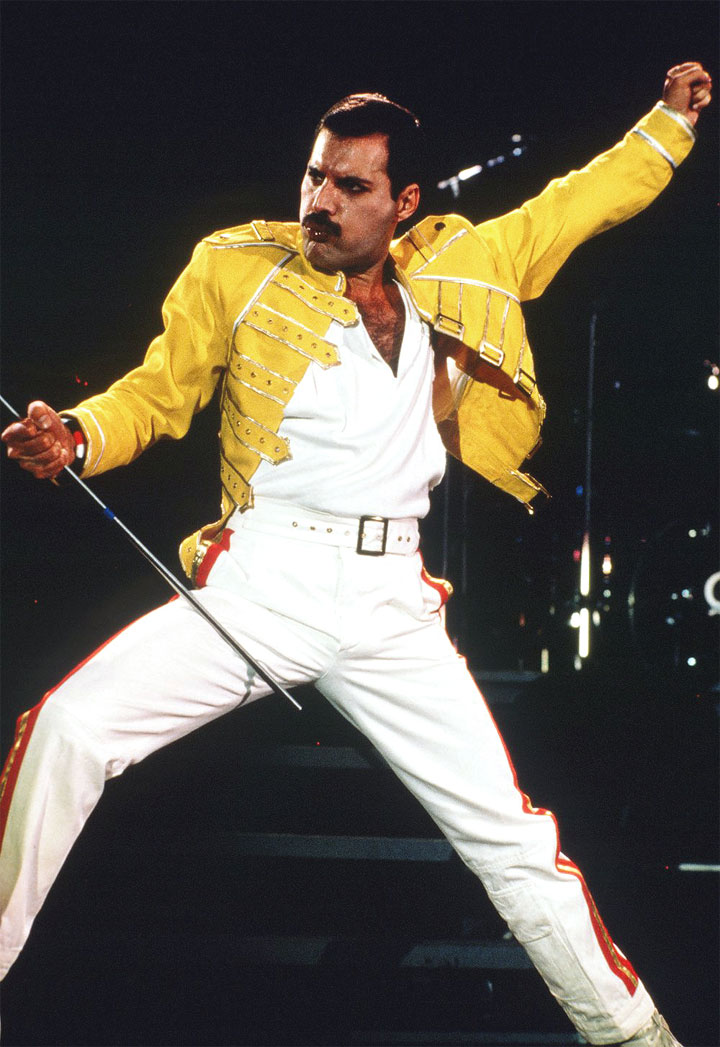Freddie Mercury Died: Remembering A Rock Icon's Final Days
The news that Freddie Mercury died sent a shockwave across the entire world, and it really did. It's a moment etched into the hearts of so many who loved his music, his stage presence, and the sheer joy he brought to millions. For fans of Queen, that day remains a very raw memory, a time when the music seemed to quiet, if only for a little while. His passing truly marked the end of an era for rock and roll, and for many, a personal loss too, you know?
He was, in a way, the very heart and soul of Queen, a band that pushed the limits of what rock music could be. His voice, his theatrical flair, and his incredible talent made him a performer like no other. He had this amazing ability to connect with huge crowds, making everyone feel like they were part of something truly special, so it's almost. People still talk about his shows with such fondness, remembering how he would command the stage, a true master of his craft, actually.
This article looks back at the final period of his life, from the hidden illness he battled for years to the moment the world learned of his struggle and, just a day later, his sad departure. We'll explore the circumstances around how Freddie Mercury died, the outpouring of sorrow that followed, and how his immense legacy continues to live on, very much alive in the music he left behind, as a matter of fact.
- Mens Hair Cuts For Older Men
- Rick Owens Age Wife
- Young Justice Free Watch
- Short Hairstyles For Fine Hair For Men
- Silly Bird Names
Table of Contents
- Freddie Mercury: A Short Life, A Grand Legacy
- The Hidden Battle: Living with Illness
- The Public Announcement and Final Days
- The Day the Music Stilled: How Freddie Mercury Died
- An Outpouring of Grief and Lasting Tributes
- His Enduring Legacy: Music That Lives On
- What Happened to Queen After Freddie's Passing?
- Frequently Asked Questions About Freddie Mercury's Passing
Freddie Mercury: A Short Life, A Grand Legacy
Freddie Mercury, a name synonymous with rock stardom, was the lead singer and frontman of the iconic British rock group Queen. His stage presence was something truly unique, and his vocal range was just incredible, really. He had this way of captivating audiences, whether he was singing a soaring ballad or a powerful rock anthem, so.
Here are some personal details about the legend:
| Full Name | Farrokh Bulsara |
| Stage Name | Freddie Mercury |
| Born | September 5, 1946 |
| Died | November 24, 1991 |
| Age at Death | 45 years old |
| Occupation | Singer, Songwriter, Record Producer |
| Band | Queen |
| Cause of Death | Bronchial pneumonia caused by AIDS complications |
| Notable Relationships | Mary Austin (former fiancée, close friend), Elton John (close friend) |
The Hidden Battle: Living with Illness
For many years, Freddie Mercury had been battling a hidden illness, a struggle he kept very private from the public eye. This was a challenging time for him, as he continued to perform and record, all while facing significant personal health struggles, you know. It shows a great deal of strength, really, to keep creating such powerful art during such a difficult period, and stuff.
- Seal Musician Age
- Denver Nuggets Vs San Antonio Spurs Matches
- Who Is Aaron Rodgers Girlfriend Now
- Tuesday Afternoon Prayer
- Who Was The First Female Nascar Driver
It was in 1987 that Mercury received his diagnosis of AIDS. This was a time when much less was understood about the condition, and there was a great deal of fear and misunderstanding surrounding it. Despite this deeply personal and serious health challenge, he continued to work with Queen, pouring his creative energy into new music, literally.
His dedication to his craft was truly something to behold, as he pushed through his weakening condition to record with the band. The music he made during these later years is, in some respects, a testament to his incredible drive and passion. He was always about the music, and that never changed, even when things got very hard, apparently.
The Public Announcement and Final Days
November 1991 brought a shocking turn of events for fans around the globe. After years of intense media speculation and his own private struggle, Freddie finally made a public announcement about his HIV diagnosis. This was a brave step, taken just a day before his untimely death, which, as a matter of fact, really caught everyone off guard.
He had kept his condition quiet for a very long time, choosing to deal with it away from the constant glare of the public. This decision to go public, just hours before his passing, showed a great deal of courage and a desire to be open about his health. It was a moment that brought a different kind of attention to his life, and to the illness he faced, you know, at the end of the day.
These final days were, by all accounts, a period of quiet reflection and a deep connection with those closest to him. Friends and collaborators, like Mike Moran, recalled moments that hinted at Freddie trying to say goodbye. His former fiancée, Mary Austin, remained one of his closest companions right up until the very end, and so on. Elton John, too, was among the select few granted access during this very private time, which is that.
The Day the Music Stilled: How Freddie Mercury Died
On November 24, 1991, the world lost a true superstar. Freddie Mercury, the British rock legend and the unforgettable frontman for Queen, died quietly at his home in West London. He was only 45 years old, a tragically young age for someone who had given so much to music, really. This day, a Sunday, marked a profound moment of sadness for countless people, obviously.
His passing was caused by bronchial pneumonia, which was a complication resulting from AIDS. Weakened by the long battle with AIDS, his body succumbed to this illness. It was a very quick decline after his public announcement, making the news even more sudden and heartbreaking for everyone who heard it, you know.
Just one day after he publicly shared his HIV diagnosis, Freddie tragically passed away. This sequence of events made the news even more poignant and difficult to process for his fans and the wider public. It was a moment that brought the realities of AIDS into sharp focus for many, and stuff, making his death a significant event beyond just music.
For those who had followed Queen's journey, the news that Freddie Mercury died was devastating. He had been a constant, vibrant presence in the music world for so long, and his absence was immediately felt. His death was a reminder of the personal toll of AIDS, and it sparked conversations that were very much needed at the time, you know, seriously.
An Outpouring of Grief and Lasting Tributes
The news that Freddie Mercury died was met with an enormous outpouring of grief from around the globe. Fans, fellow musicians, and people from all walks of life expressed their deep sorrow. It was a collective moment of sadness, a shared feeling of loss for a performer who had touched so many lives with his incredible talent and spirit, basically.
Tributes poured in from everywhere. People gathered to remember him, playing his music, sharing stories, and reflecting on the impact he had made. The sadness was palpable, a quiet hush falling over the music community as they absorbed the news. It was clear that he wasn't just a singer; he was a cultural icon, and so on, whose absence would be felt for a very long time.
His Queen bandmates and close friends shared their memories of the iconic singer, remembering his warmth, his humor, and his boundless creativity. These personal reflections helped paint a picture of the man behind the legendary performer, showing a different side of him, you know, one that was cherished by those closest to him. They spoke of his resilience and his dedication to music, even in his final years, which is that.
The sorrow was not limited to just his immediate circle or even just music fans. His death resonated with a wider audience, bringing a human face to the AIDS crisis and prompting greater awareness and compassion. It was a moment that, in a way, helped to change perceptions and encourage more open discussion about the illness, actually.
His Enduring Legacy: Music That Lives On
Even decades after the world learned that Freddie Mercury died, his voice and his memory are still cherished by millions. His music, particularly with Queen, continues to resonate with new generations, proving that true artistry truly stands the test of time, you know. Songs like "Bohemian Rhapsody" are still played constantly, beloved by people everywhere, as a matter of fact.
He was posthumously featured on Queen's final album, "Made in Heaven," which was released in 1995. This album was a very special collection, a way for the band to share some of his last recordings with the world. It was a poignant farewell, a final gift of music from a truly unique artist, and stuff, showing his continued creative spirit even when he was very ill.
Freddie Mercury remains, in many ways, an enigma, even nearly 27 years after his death. His life, his art, and his struggle continue to fascinate people, prompting new discussions and interpretations. The Queen biopic, which touches on his life and his shocking death at 45, has introduced his story to an even wider audience, ensuring his story continues to be told, obviously.
His last years were indeed marked by illness, but he continued to create music, leaving a lasting impact that few artists ever achieve. His passing shocked fans worldwide, but it also led to countless tributes and ongoing efforts to remember his contributions, both to music and to AIDS awareness. His influence is still felt deeply in the music world, and that's just a little bit of it, too.
What Happened to Queen After Freddie's Passing?
After Freddie Mercury died, the remaining members of Queen faced a profound challenge. How do you continue without a frontman as iconic and irreplaceable as Freddie? The band, in a way, honored his memory by releasing the "Made in Heaven" album, which featured his last recordings. This was a very important step, allowing fans to hear new material from him even after his passing, you know.
While Queen continued to perform and release music in various forms over the years, often with guest vocalists, the dynamic was, of course, forever changed. No one could truly fill Freddie's shoes, and the band acknowledged that by not trying to replace him directly. They found ways to keep his spirit alive in their performances, often incorporating his vocals or imagery, which is that.
The band's legacy, tied so closely to Freddie's incredible talent, continued to thrive. Their music found new audiences through various projects, including stage shows and the biopic. The story of Queen and Freddie Mercury remains a powerful one, a testament to their collective artistry and his individual brilliance, so, in some respects, their journey continued, just differently.
Frequently Asked Questions About Freddie Mercury's Passing
When did Freddie Mercury pass away?
Freddie Mercury passed away on November 24, 1991. Wednesday, November 24 marks 30 years since he tragically passed away, which is that, so it's a date many people remember very clearly.
What was the cause of Freddie Mercury's death?
Freddie Mercury died from bronchial pneumonia, which was caused by complications from AIDS. He had been diagnosed with AIDS in 1987, and his health had been weakening for some time, you know, before his passing.
How old was Freddie Mercury when he died?
Freddie Mercury was 45 years old when he passed away. He died at a tragically young age, just one day after he publicly announced his HIV diagnosis, which was a very sad moment for many, really.
- Jennifer Love Hewitt Body Measurements
- Types Of Hairstyles Female
- Black Slave Last Names
- On Their Way
- What Happened To Duck Dynasty Family

Freddie Mercury - Freddie Mercury Photo (13367184) - Fanpop

Celebrate The Magic Of Freddie Mercury - Radio X

Biografia di Freddie Mercury, vita e storia